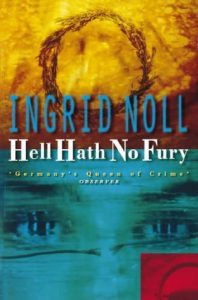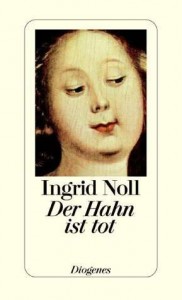When old barns burn…
Rosemarie Hirte is an average woman with an average life – so it seems. She never married, lives alone, is working in an insurance company. She is diligent but not openly ambitious, a very respected colleague. Her social contacts outside work are very few: Beate, an old friend (but not particularly close) and Frau Römer, an elderly colleague whose dog she is walking from time to time.
There is no man in Rosemarie’s life, and the very few occasions when a man had shown a serious interest in her during her younger years ended with deep disappointments for her: either she was deserted for a more attractive (or more interesting) woman, or the married man returned finally to his wife. Also the fact that she couldn’t finish her studies has had an impact on her. Rosemarie Hirte, who is also the narrator of the story, is an embittered spinster in her early fifties who has the feeling that her life was one of missed opportunities, there can be no doubt about it.
But then everything seems to change. Against her usual habit, she is giving in to Beate to visit a reading evening together. The author Rainer Witold Engstern is talking about German romanticism and its poets. Rosemarie is not a particular poetic person, but Witold, as she calls him soon secretly, is a handsome man, some years younger than Rosemarie and he has a voice for which she falls immediately. Unfortunately, he is married, but the good news (good for Rosemarie) is that something is wrong with the marriage and Witold’s wife left him some time ago.
Although it seems most unlikely – men in Witold’s age are rarely attracted to women like Rosemarie – Rosemarie is determined to use this last chance and all obstacles need to be set aside to be cleared, at no matter what costs. Witold will not escape her, that’s a promise she makes to herself. He is the man of her dreams, the man who has to make up for all the disappointments in her previous life.
I don’t want to give the story away, but we see a total transformation going on with Rosemarie. She develops an enormous and ruthless energy that is really remarkable. People that are in her way – well, they are just obstacles which need to get out of her way. If not…
One remark about the names of some of the protagonists. Engstern, the name of Rosemarie’s love interest means literally “narrow star”, but it is just one letter away from Engstirn (=narrow mind). I think this is called an aptronym (Thomas Mann was master in this art). As it turns out later, Witold is not exactly the bright star that Rosemarie saw in him first.
The name Rosemarie is a bit old-fashioned and the reader might think of a woman doing crocheted blankets in her free time. A Hirte is a shepherd in German, but Rosemarie is quite the opposite of the good shepherd – so in this case the author is intentionally misleading the reader. The contrast between the name and the real character adds to the black humor that is present in many situations. The peaceful and almost Mediterranean Bergstrasse region where most of the story takes place (and where Noll is living), is another stark contrast that is remarkable. (Since I also lived for a long time in this region, this added even a bit more to my pleasure reading this book.)
Rosemarie’s crude energy and industriousness made me laugh on many occasions when I read the book. But sometimes I also shivered. The book gives us an opportunity to have a look into a truly dark soul. In my opinion an excellent crime novel – with an unexpected end.
This is a novel in the tradition of Patricia Highsmith and it was the first book of Ingrid Noll, now considered Germany’s leading female crime author. Noll, born in Shanghai in 1935, is the wife of a pharmacist. She started to write after her children had grown up and had left the house. Hell Hath No Fury was published in 1991 in Germany. Until today she has published twelve crime novels, several books with stories and a children’s book. The original title Der Hahn ist tot refers to the old French kanon Le coq est mort (The rooster is dead).
Ingrid Noll: Hell Hath No Fury, HarperCollins 1997; Der Hahn ist tot, Diogenes 1991
© Thomas Hübner and mytwostotinki.com, 2014. Unauthorized use and/or duplication of this material without expressed and written permission from this blog’s author and/or owner is strictly prohibited. Excerpts and links may be used, provided that full and clear credit is given to Thomas Hübner and mytwostotinki.com with appropriate and specific direction to the original content.





 Facebook
Facebook RSS
RSS Twitter
Twitter